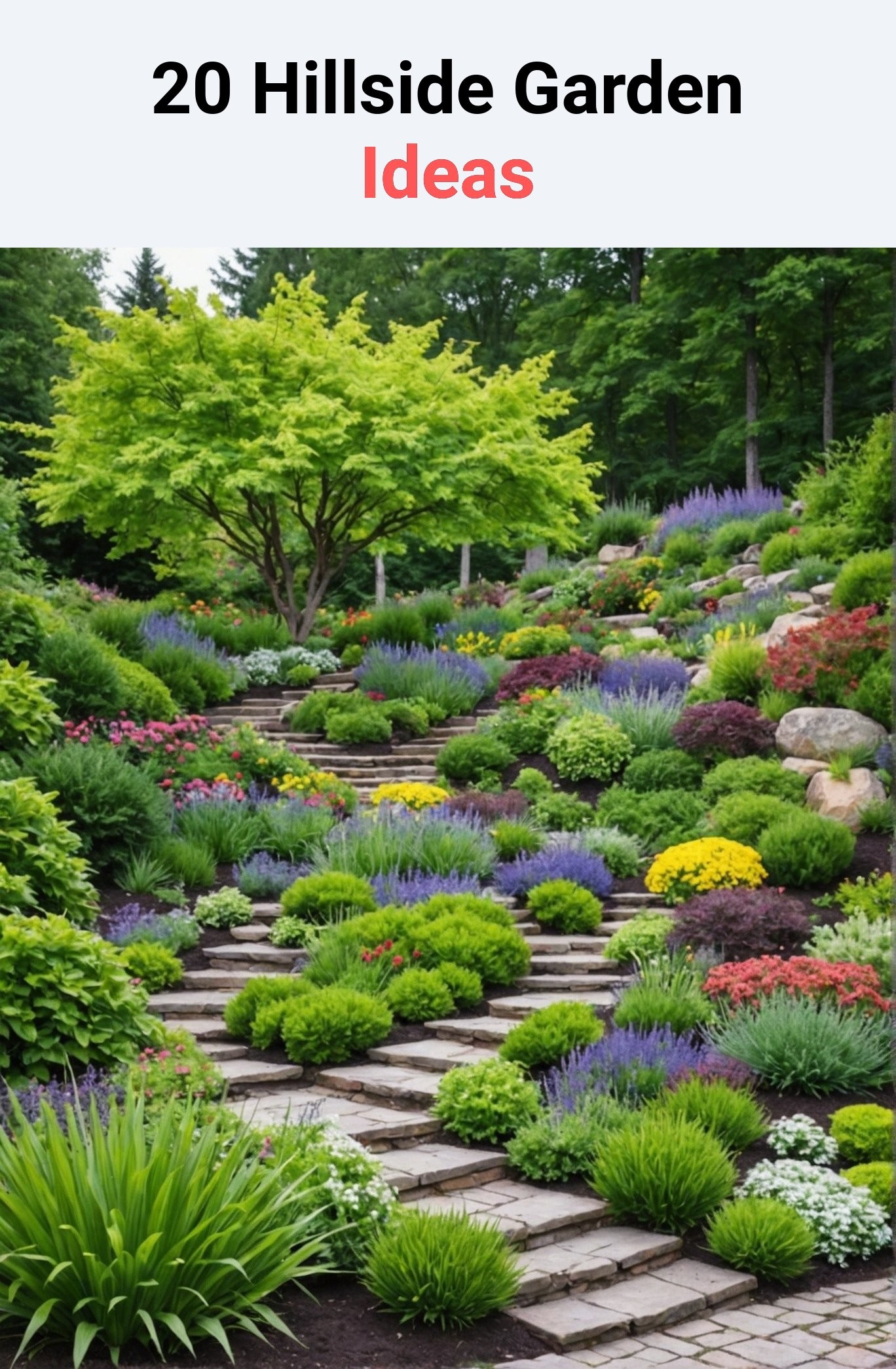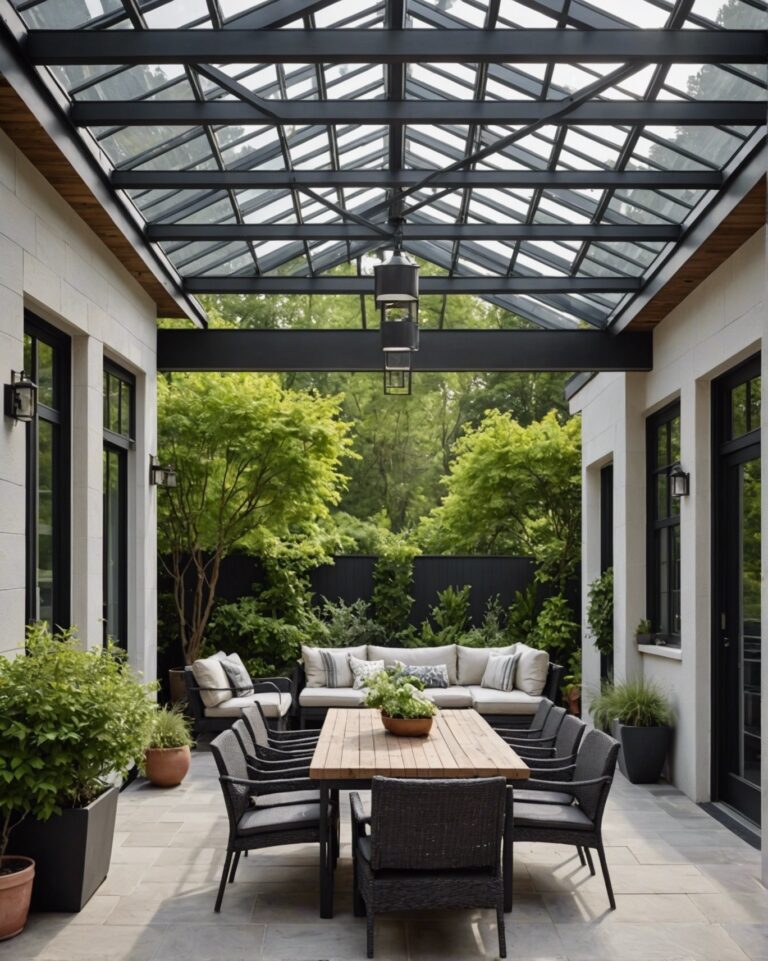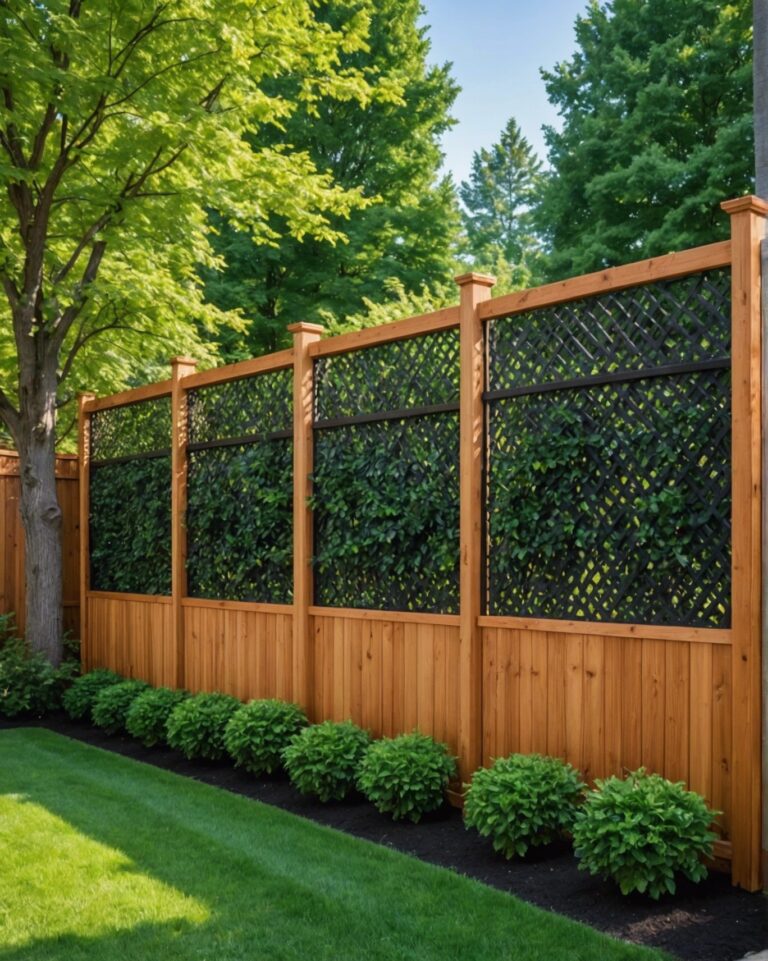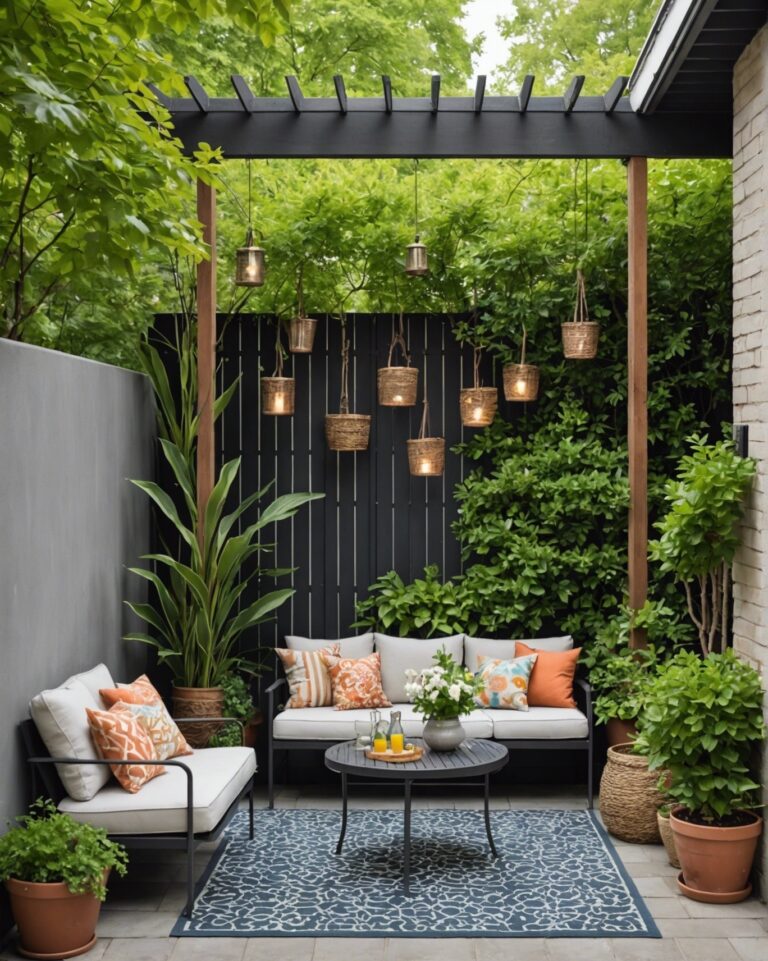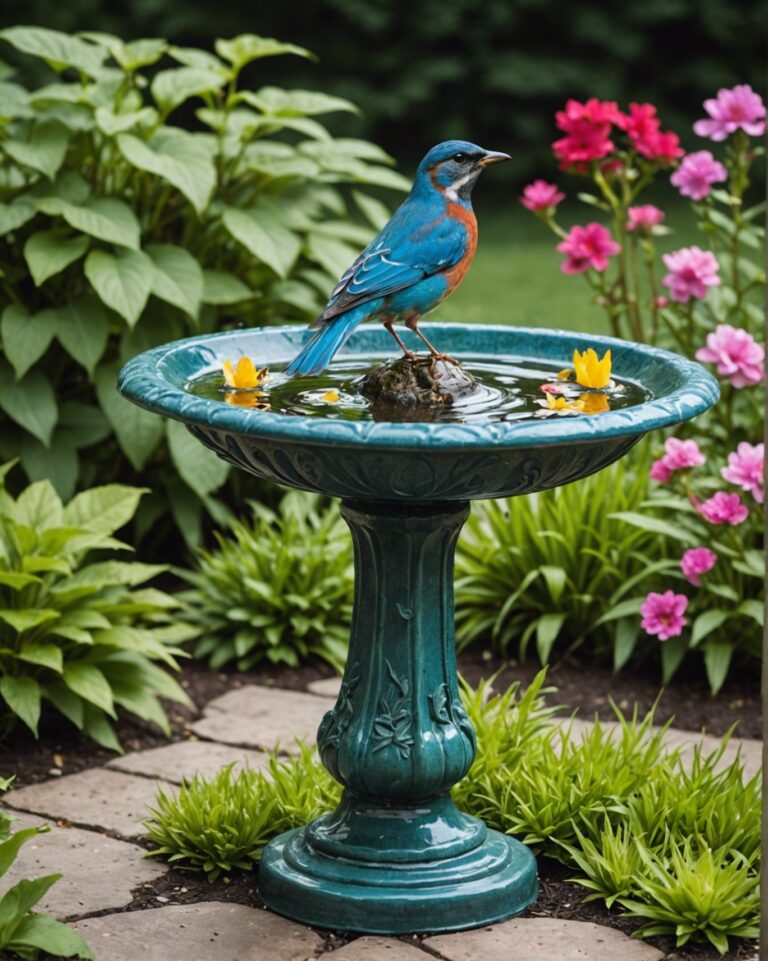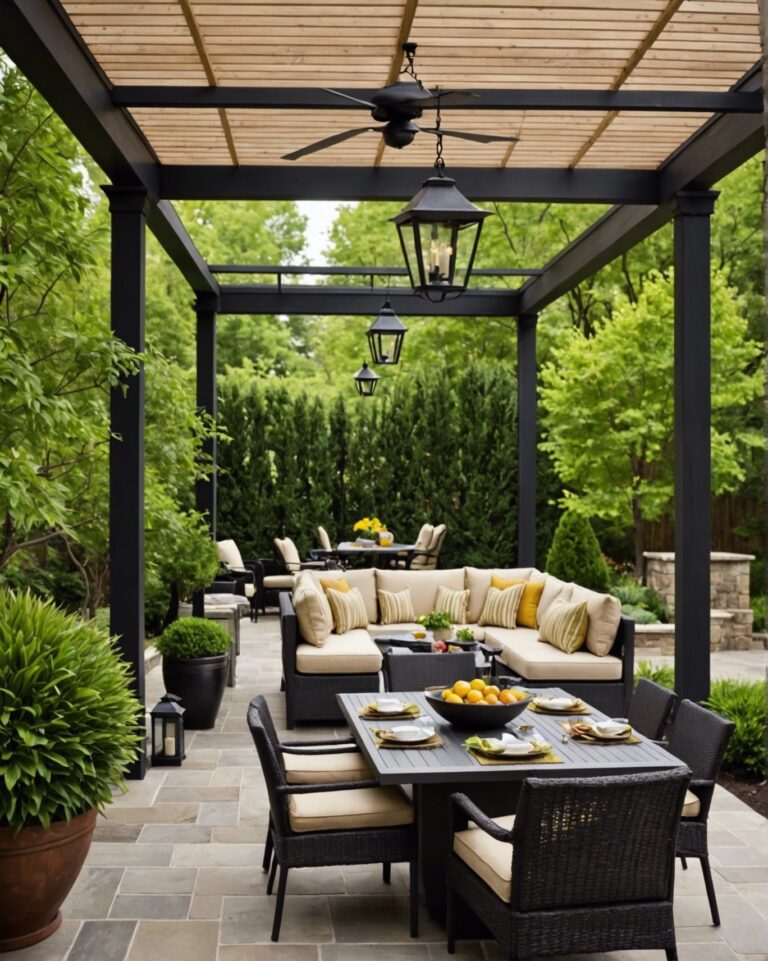20 Hillside Garden Ideas
Hillside gardens offer a unique canvas for creative landscaping. Take advantage of the natural slope to create a visually stunning outdoor space with tiered planters, cascading water features, and meandering pathways.
From succulent gardens to flowering vines, get inspired by these 20 hillside garden ideas to transform your sloping landscape into a breathtaking retreat.
Cascading Water Feature
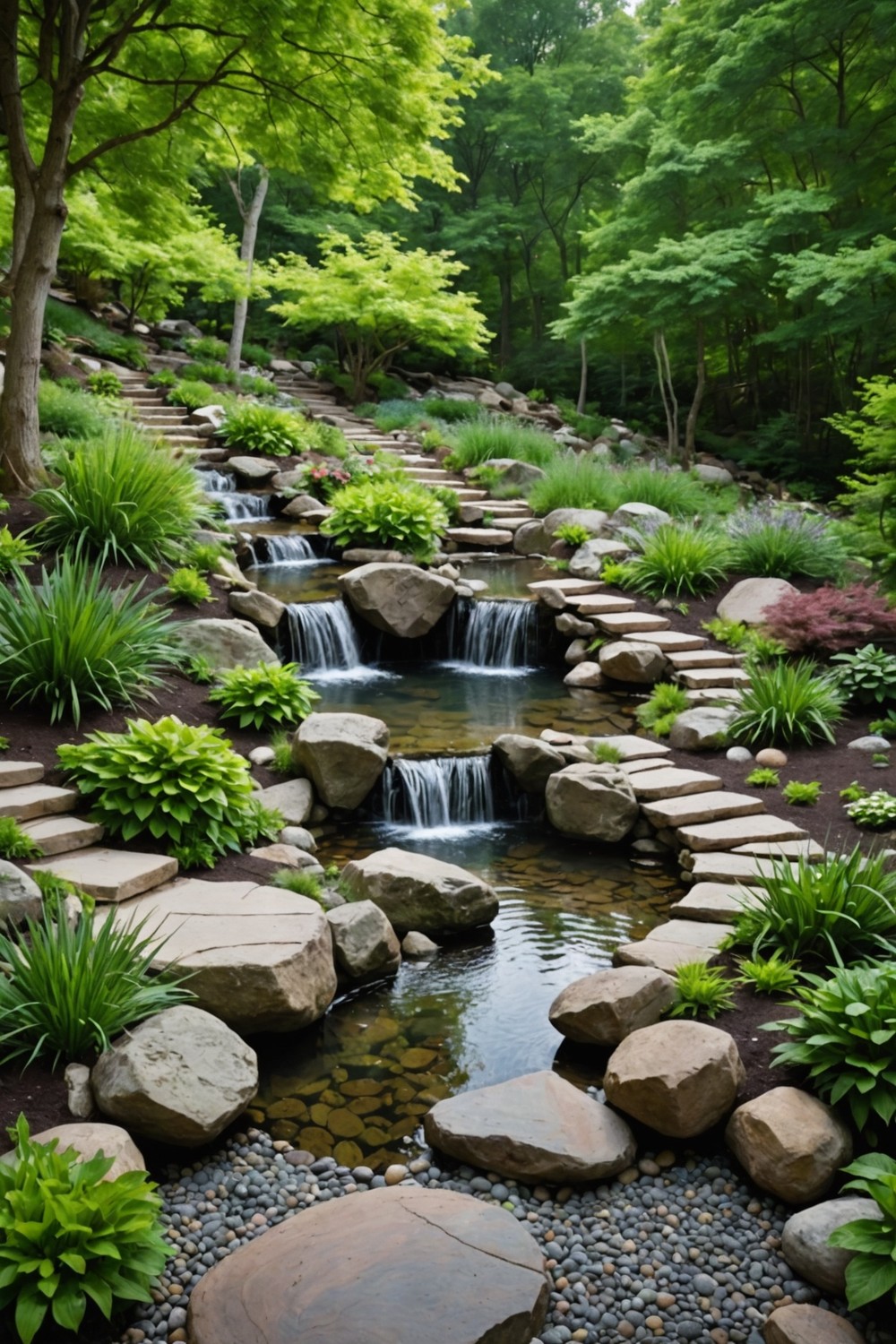
A cascading water feature can add a striking visual element to a hillside garden. The gentle sound of running water creates a soothing atmosphere, while the sight of water flowing down the slope creates a sense of serenity.
This feature can be achieved by installing a series of small ponds or waterfalls, allowing the water to flow from one level to the next, creating a mesmerizing display of sound and sight.
Tiered Planters
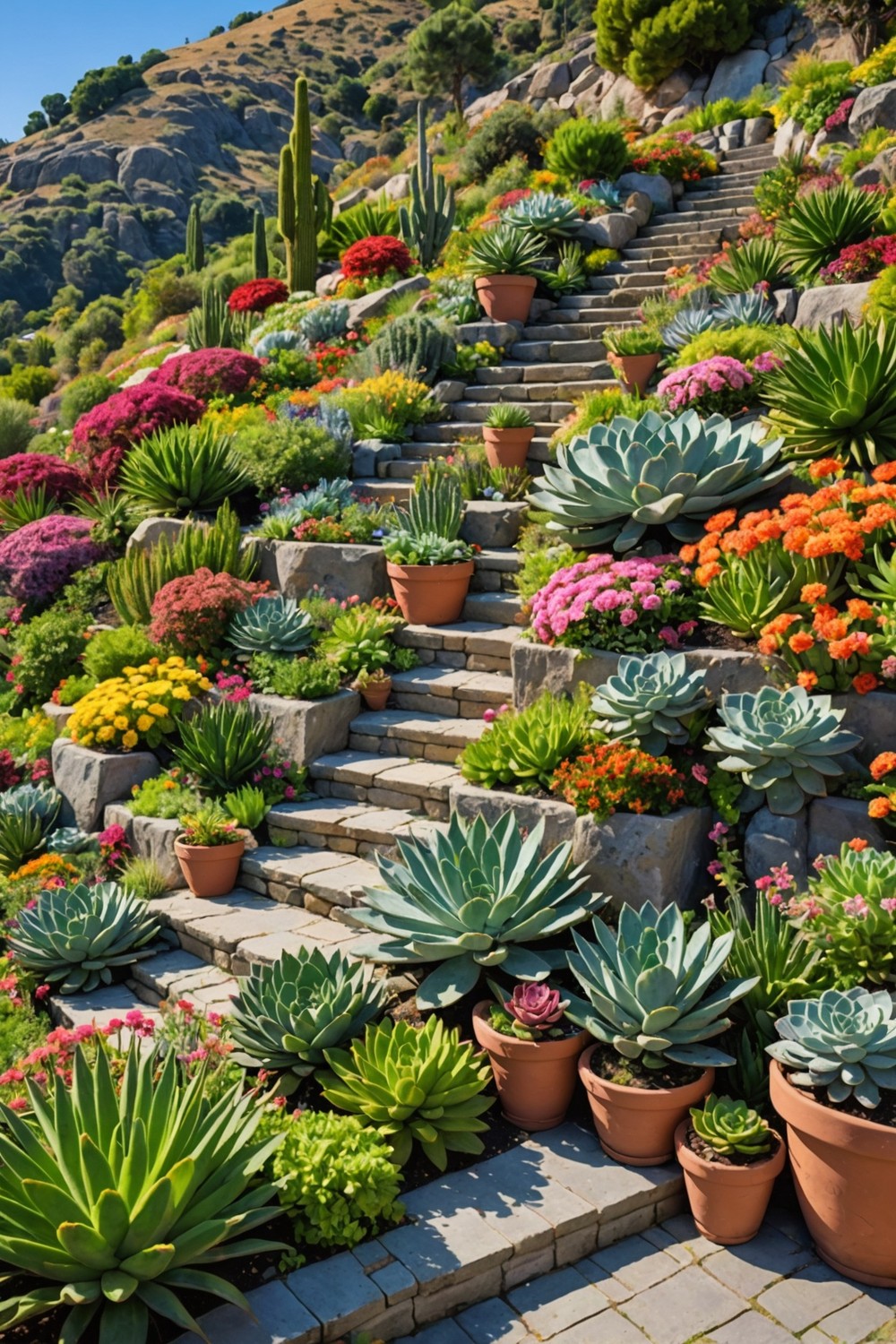
Tiered planters are a fantastic way to add visual interest and maximize space in a hillside garden. By stacking multiple planters on top of each other, you can create a beautiful, multi-level display of flowers, herbs, or succulents.
This is especially useful on sloping ground, where a traditional garden bed might be impractical.
Plus, tiered planters can help to create the illusion of more depth and dimension, drawing the eye upward and outward.
Rock Garden Pathway
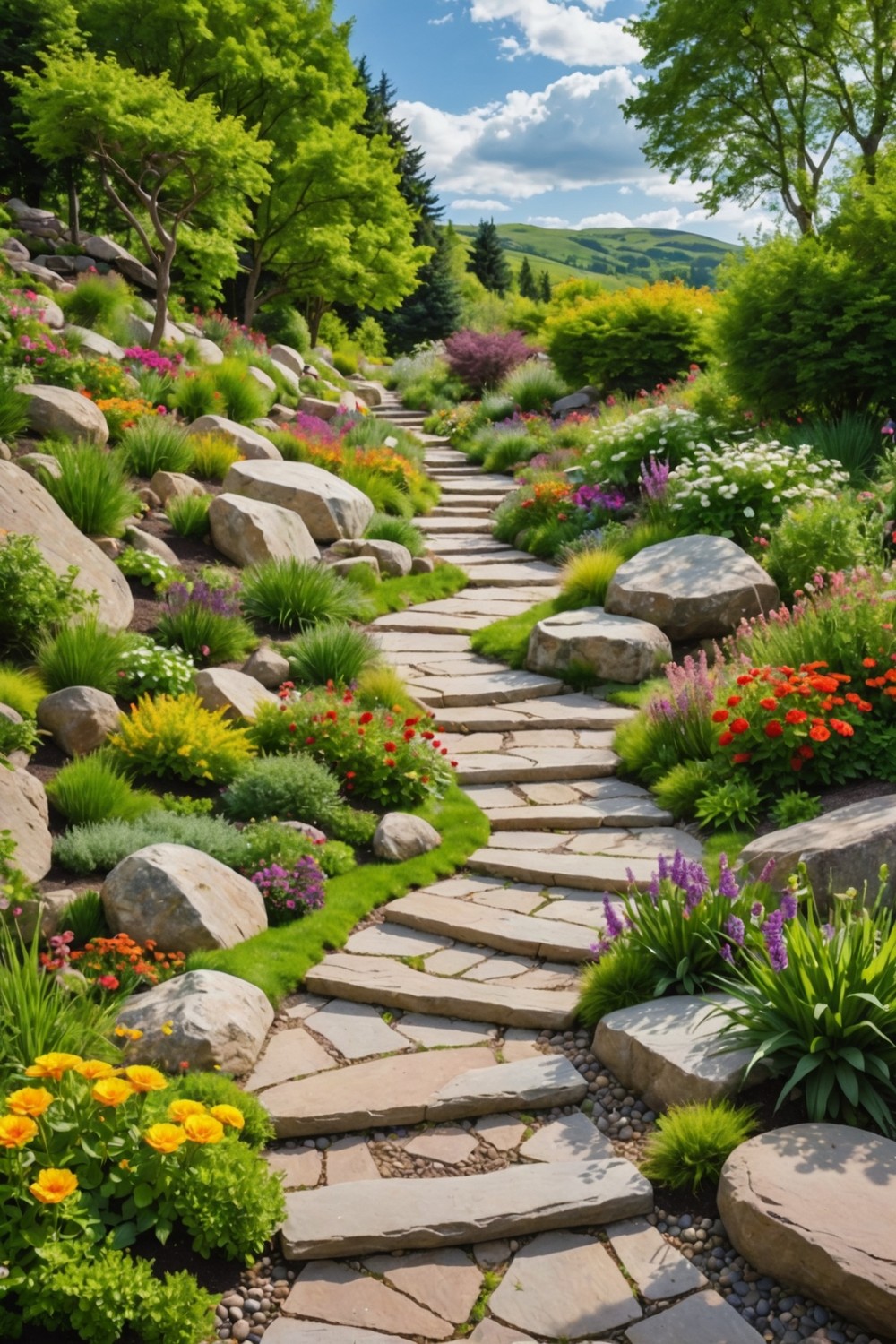
A rock garden pathway creates a beautiful and natural-looking passage through your hillside garden. By using a mix of small and large rocks, you can create a meandering path that guides visitors through your outdoor space.
This feature also helps to control erosion and create a sense of harmony between your garden’s natural slopes and your cultivated plants.
Plus, the varied textures and colors of the rocks add visual interest to your overall design.
Hillside Succulent Garden
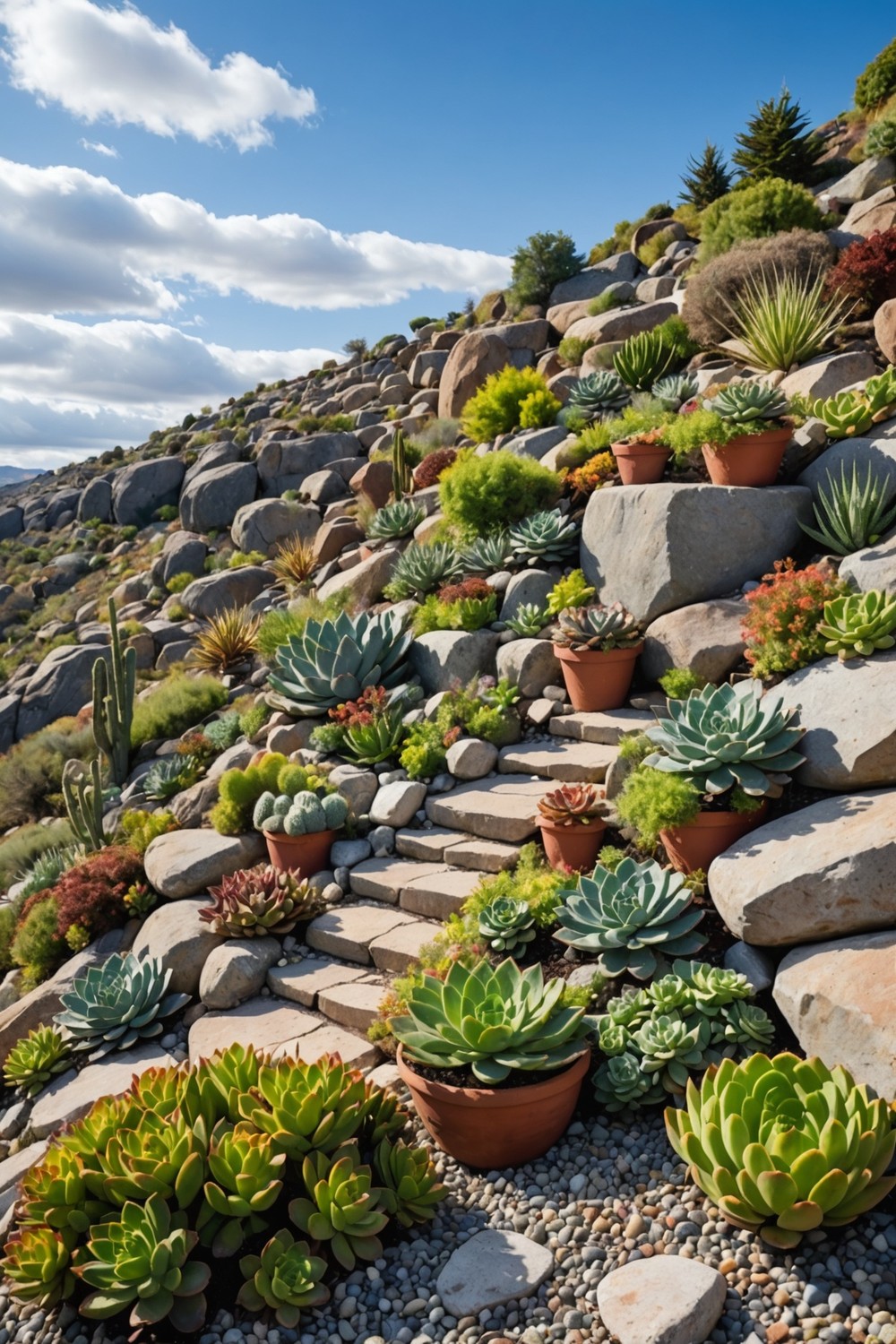
A hillside succulent garden is an ideal solution for slopes that are difficult to maintain. Succulents are perfect for hillside gardens because they have low water requirements, which reduces the need for frequent watering, and their shallow roots prevent soil erosion.
Additionally, succulents come in a variety of shapes, sizes, and colors, making them a visually appealing choice for a hillside garden.
DIY Stone Retaining Wall
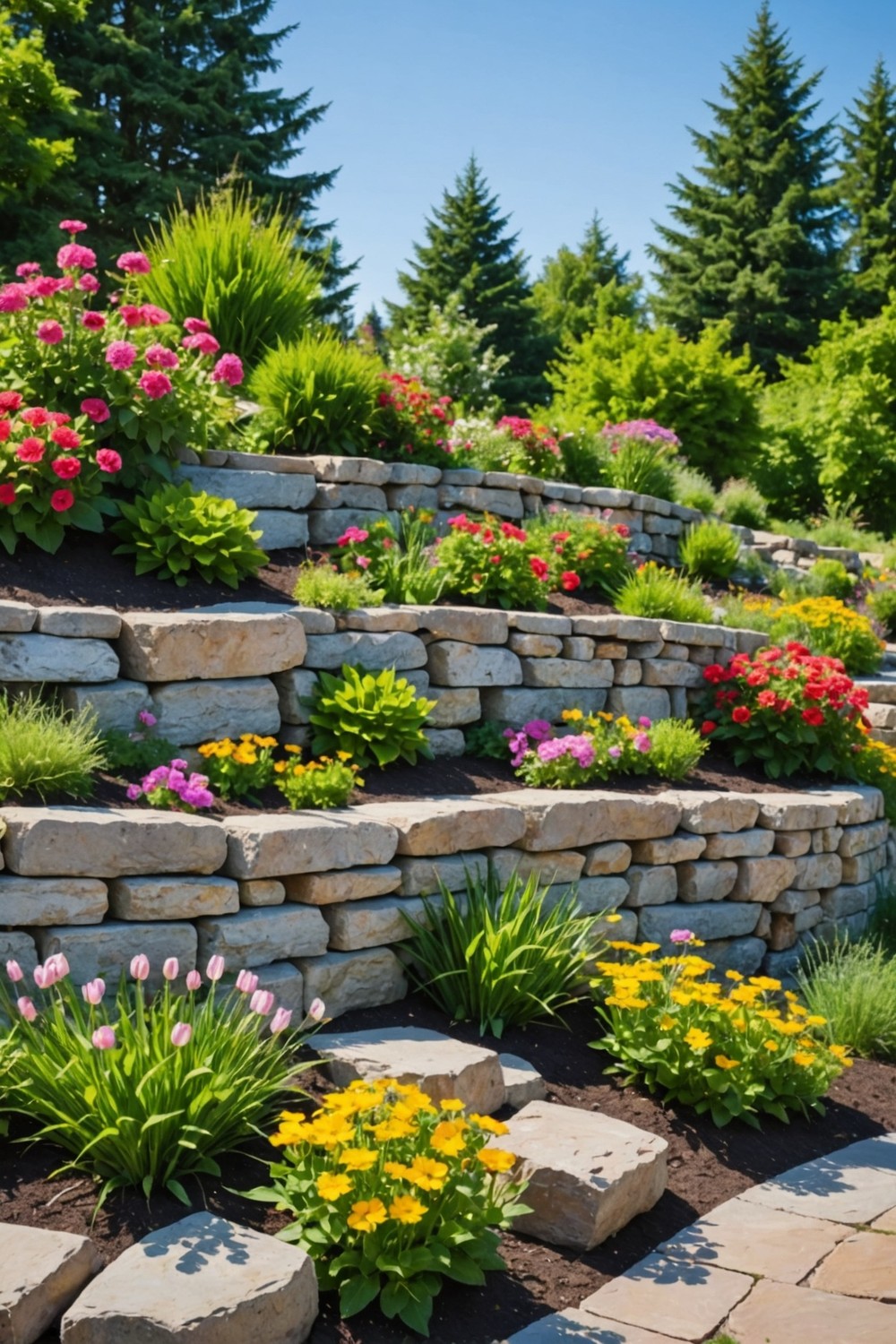
A DIY stone retaining wall is a fantastic way to create a sense of structure and definition in your hillside garden. By using natural stone, you can create a beautiful, rustic wall that not only adds visual appeal but also helps to prevent soil erosion and create separate areas within your garden.
Start by digging a trench and laying a level foundation, then begin stacking your stone blocks, making sure to stagger the joints for added strength.
With some patience and elbow grease, you can create a stunning stone retaining wall that adds charm and functionality to your outdoor space.
Flowering Vines on a Trellis
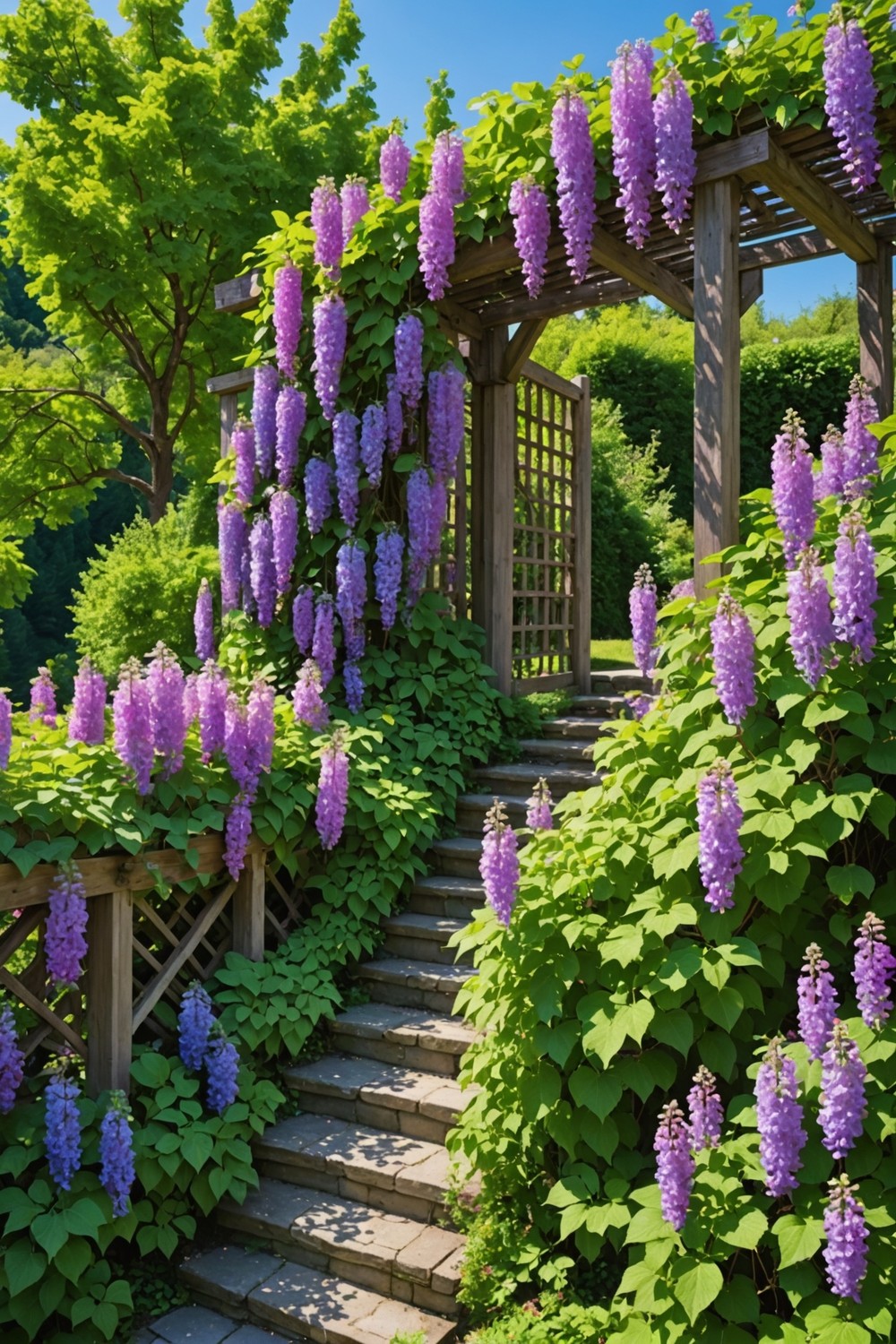
Flowering vines on a trellis can add a whimsical touch to your hillside garden.
They’re perfect for covering unsightly slopes or providing shade in warm areas.
Clematis, wisteria, and honeysuckle are popular choices that thrive in hillside conditions.
train them to climb up a sturdy trellis, and you’ll be rewarded with a dazzling display of colors and fragrances.
Landscaped Steps
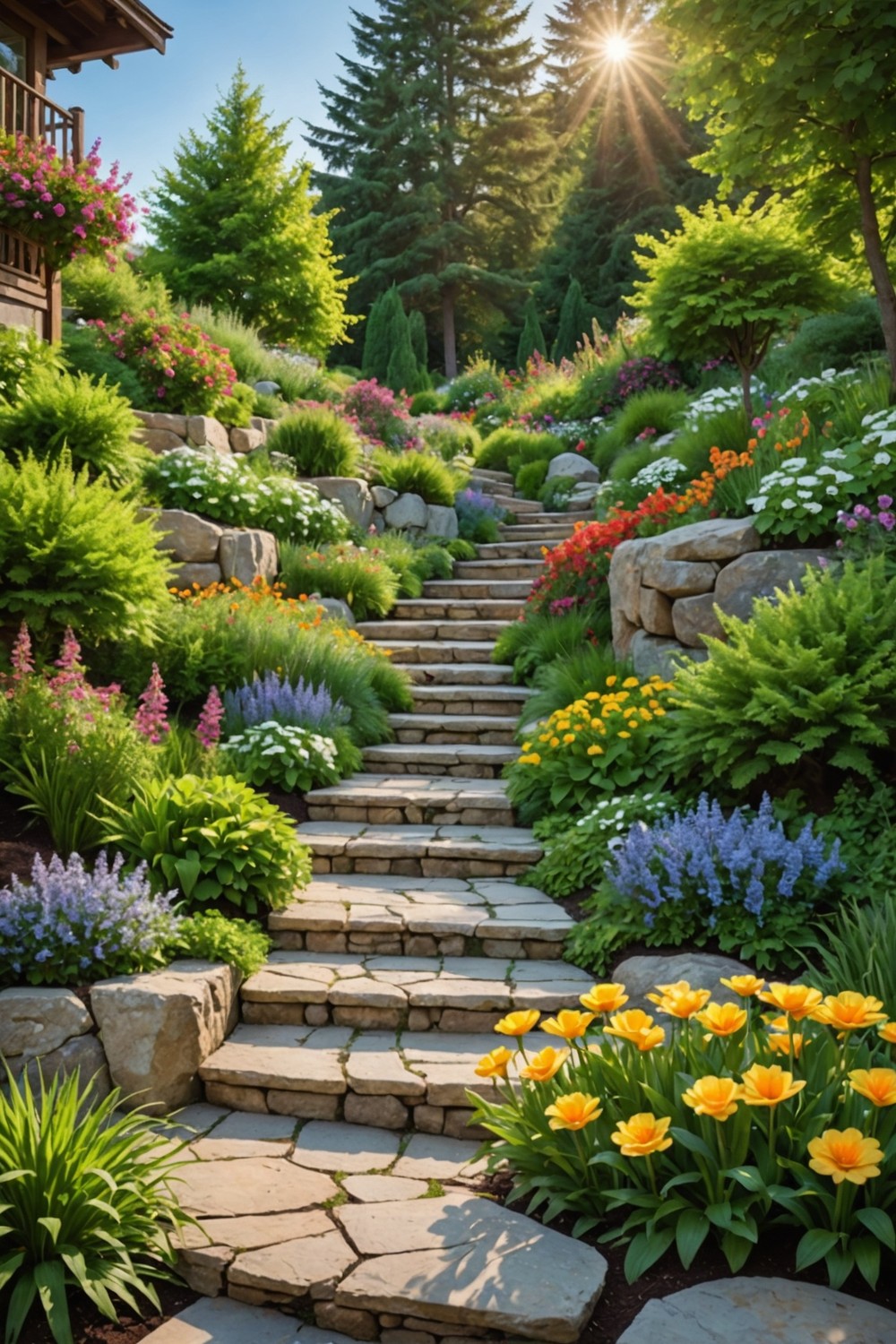
Landscaped steps are a beautiful way to connect different levels of your hillside garden, creating a seamless transition between areas. By incorporating lush greenery, ornamental plants, and decorative materials, these steps blend effortlessly into the surrounding landscape, softening the look of traditional staircases.
Natural Stone Seating Area
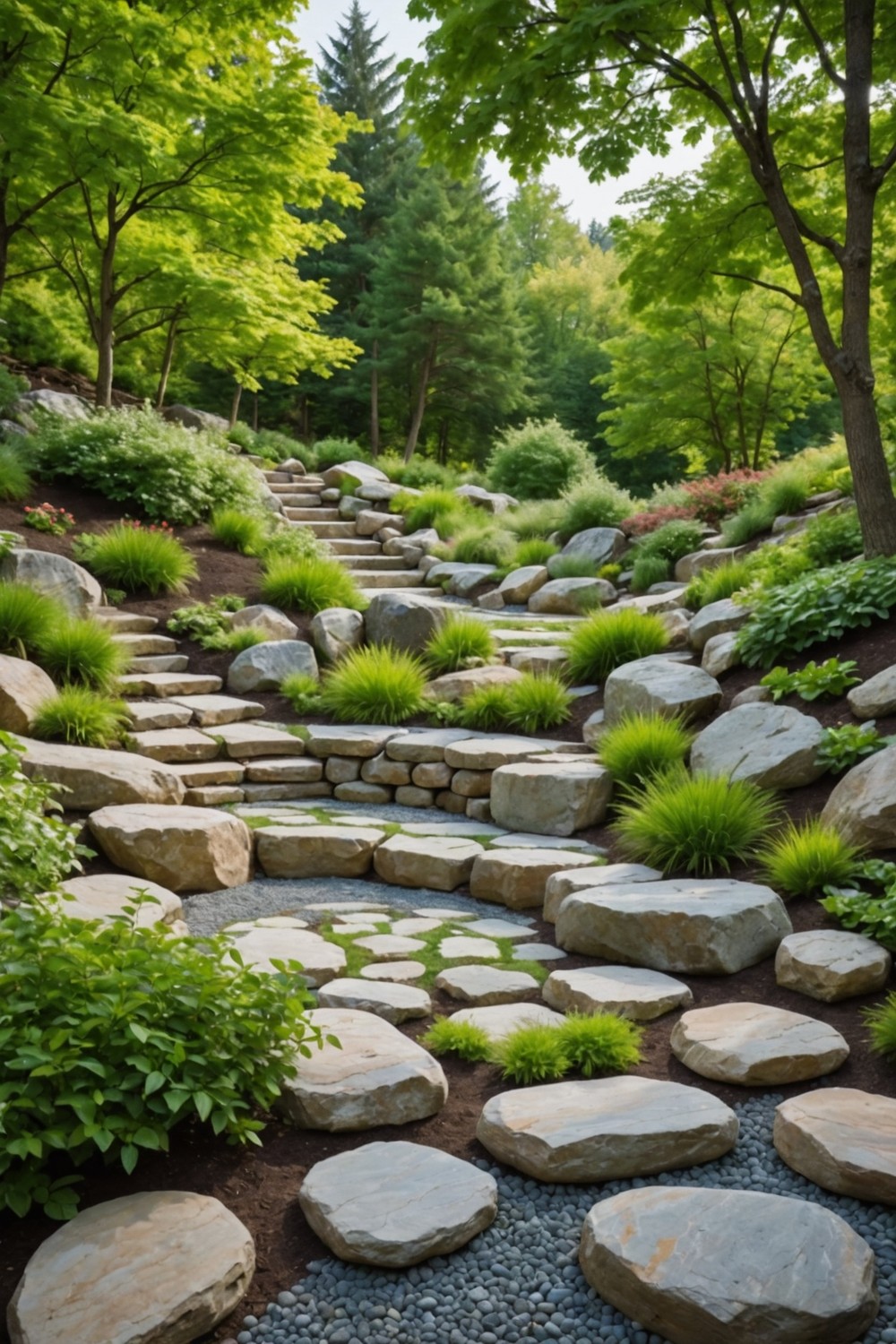
A natural stone seating area can be a tranquil oasis in your hillside garden, blending seamlessly into the surrounding landscape. Large, flat stones or boulders can be arranged to create a comfortable seating space, while smaller stones or pebbles can be used to define the area and add texture.
This organic seating area will encourage you to slow down and take in the breathtaking views of your hillside garden.
Boulders and Wildflowers
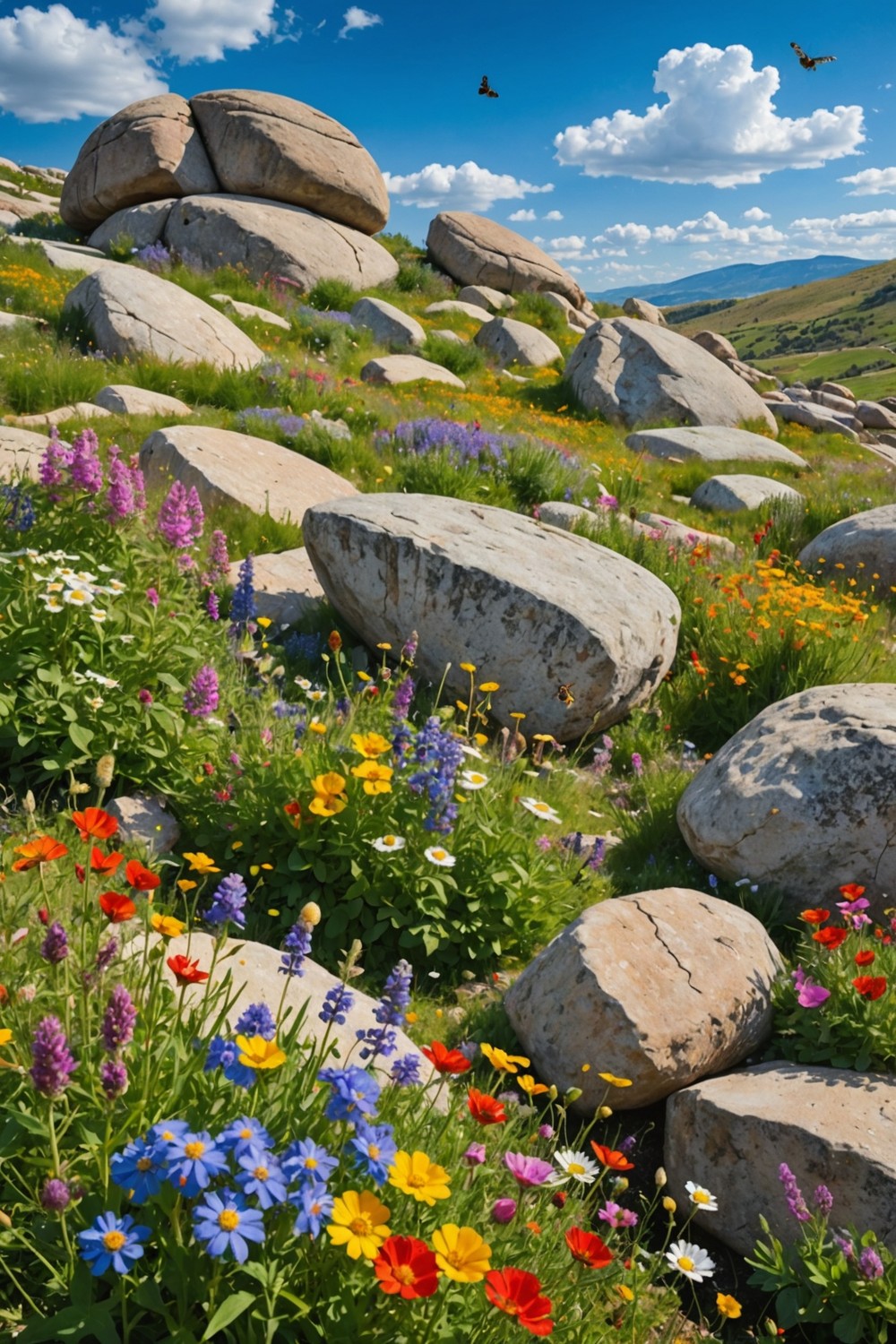
Boulders and wildflowers create a harmonious contrast in your hillside garden, blending ruggedness with whimsy. Strategically placing large rocks throughout the slope adds visual appeal and helps with erosion control.
Meanwhile, allowing wildflowers to bloom between and around the boulders injects a pop of color and effortless elegance.
This combination also encourages wildlife to visit, making your hillside garden a haven for nature.
Winding Pebble Path
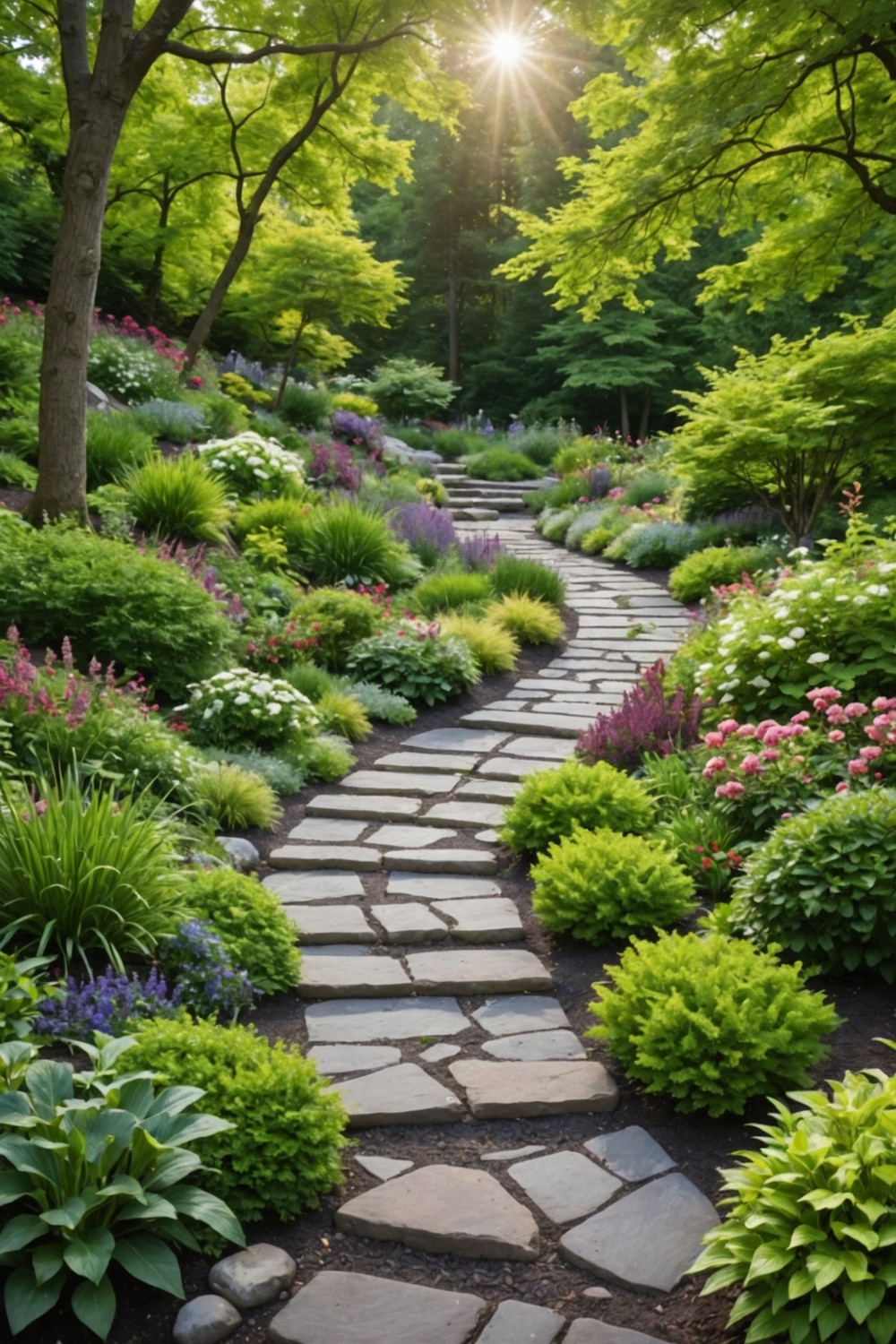
A winding pebble path adds a touch of serenity and whimsy to your hillside garden, creating a sense of journey and exploration. By curving and twisting through the landscape, it guides visitors through the garden, drawing attention to hidden corners and secret spots.
The soft, muted colors of the pebbles blend seamlessly with the surrounding foliage, creating a romantic and peaceful ambiance that invites relaxation and contemplation.
Hillside Orchard
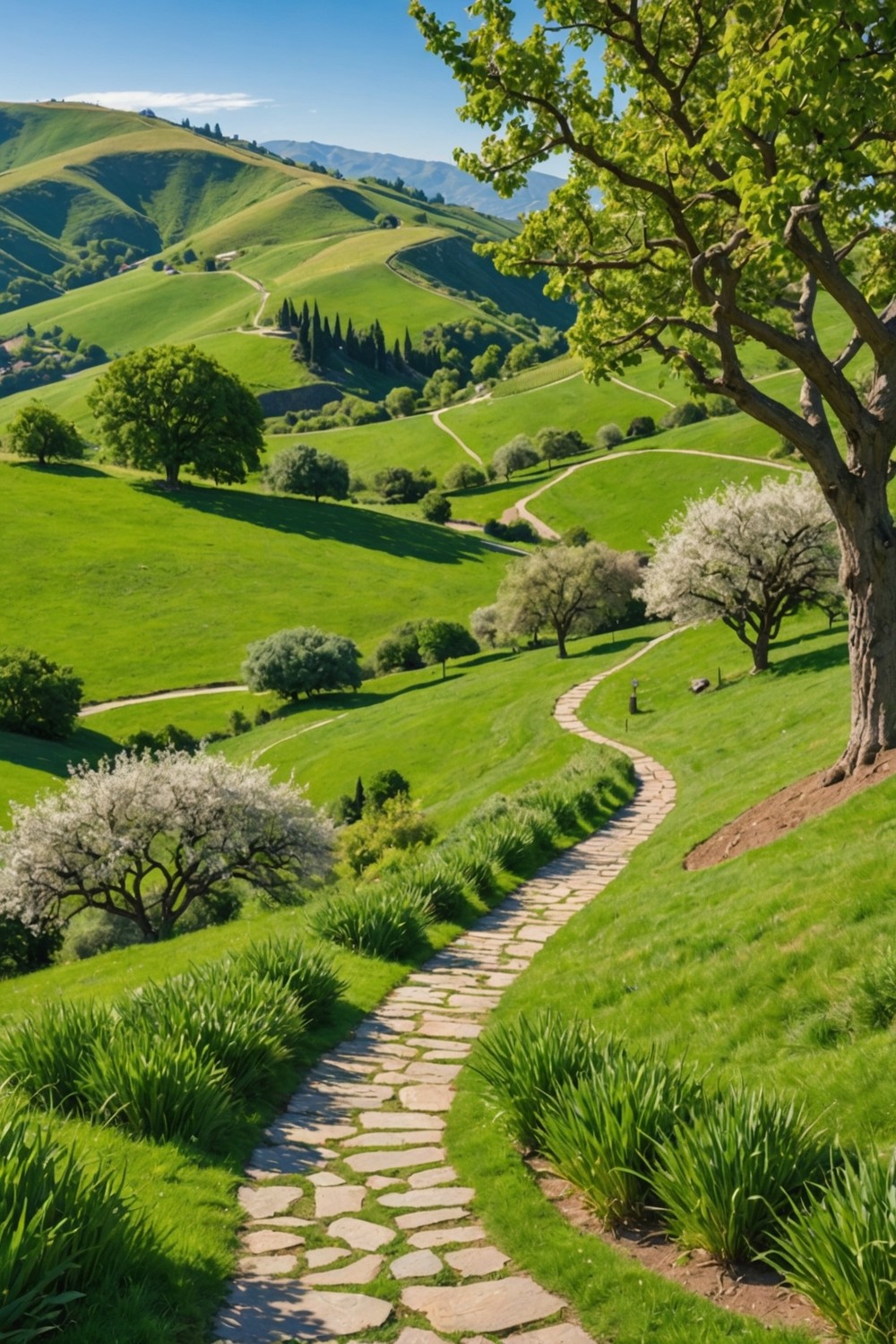
A hillside orchard is a great way to utilize a sloping landscape, providing a picturesque and productive space.
By planting fruit trees or nut trees on a hill, you can create a beautiful and functional garden that yields delicious rewards.
Plus, the natural slope can help with drainage and aeration, making it easier to maintain a healthy orchard.
Rain Chain Water Feature
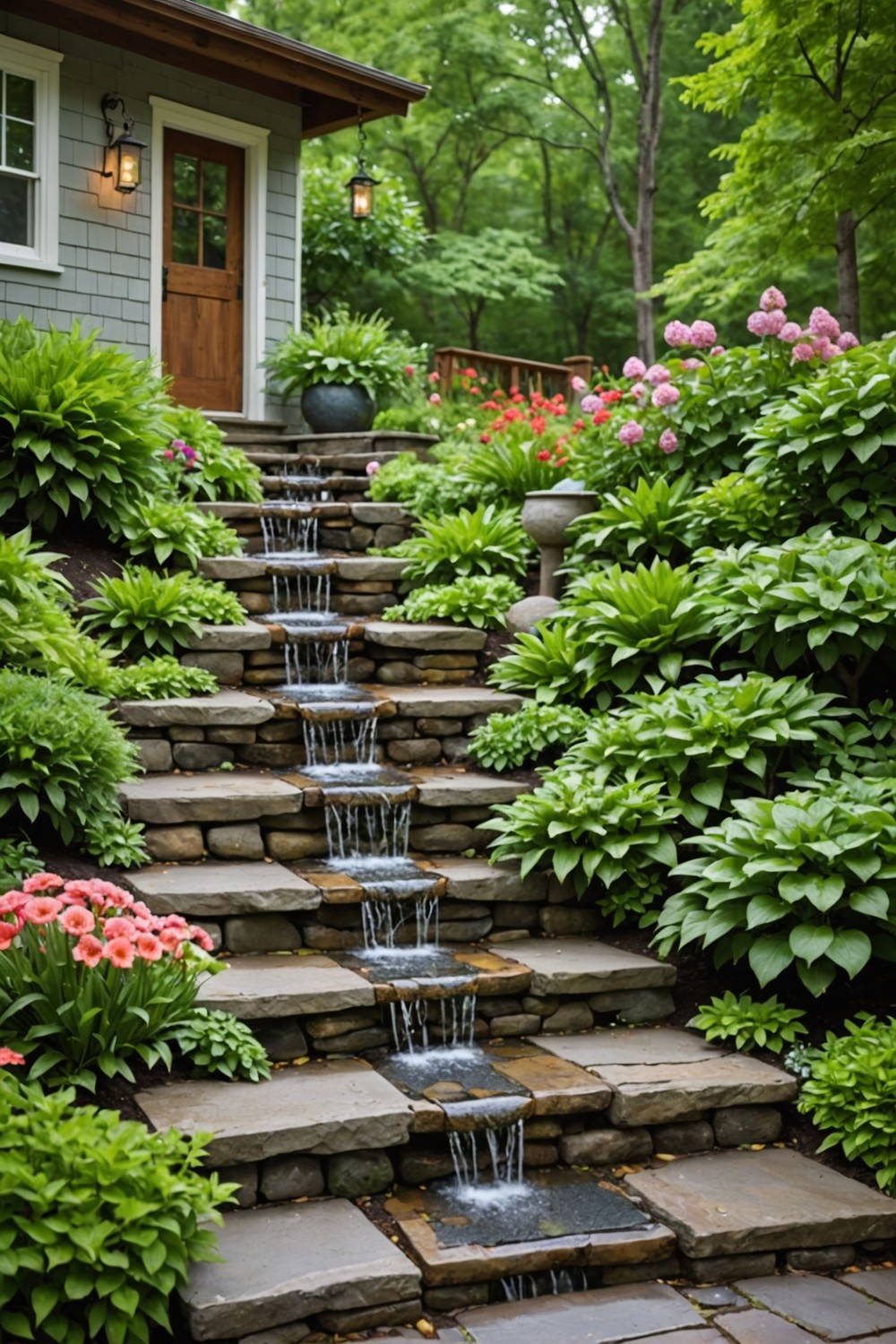
A beautiful rain chain water feature is a mesmerizing addition to any hillside garden. It’s a functional and visually appealing way to channel rainwater from your roof to the ground, creating a soothing, melodic sound as the water flows.
The chain’s gentle clinking creates a sense of tranquility, while the water’s movement adds dynamic visual interest to your outdoor space.
Built-in Seating Wall
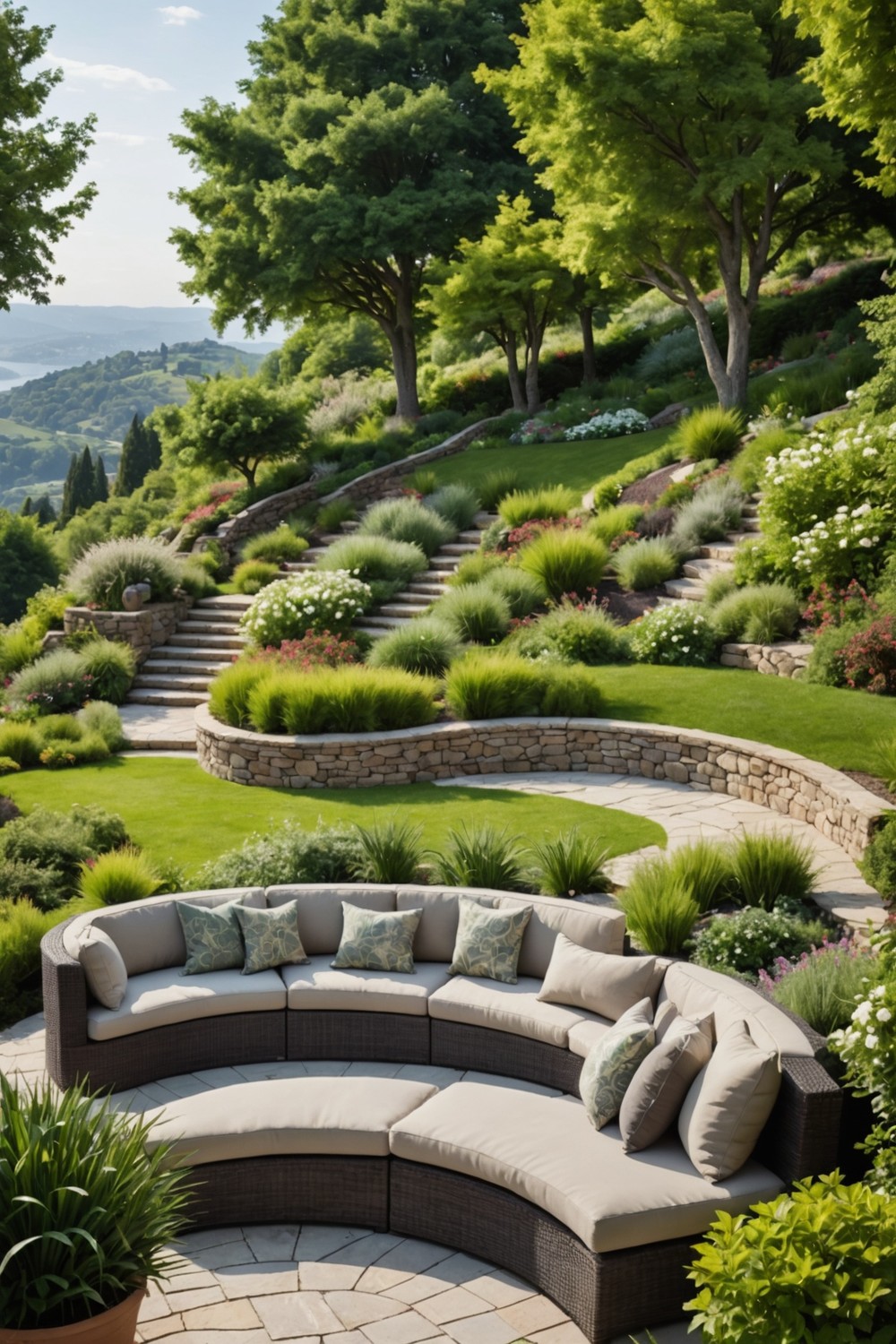
A built-in seating wall is a clever way to create a cozy nook in your hillside garden.
It not only provides a comfortable spot to sit and take in the views but also helps to define different areas within the garden.
By incorporating the seating wall into the landscape, you can create a seamless transition between the seating area and the rest of the garden, making the space feel more intimate and inviting.
Colorful Perennials
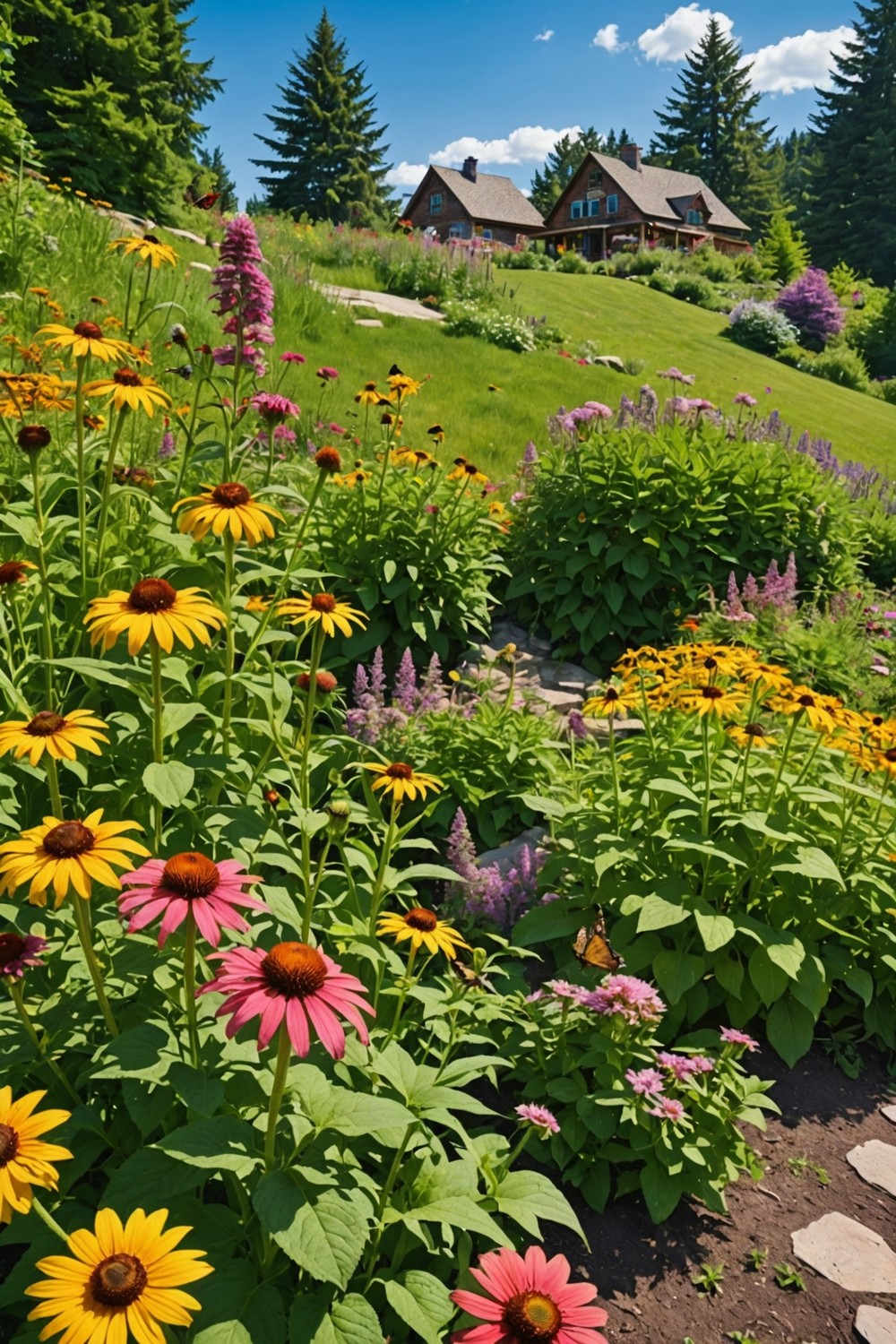
Colorful perennials are a fantastic choice for hillside gardens as they provide a vibrant splash of color and require minimal maintenance.
Plants like coneflowers, black-eyed susans, and bee balm attract butterflies and hummingbirds, adding to the beauty of your hillside garden.
They also help to hold the soil in place, preventing erosion and reducing the need for retaining walls.
Plus, they come back year after year, providing a low-maintenance solution for your hillside landscape.
Small Tree Grove
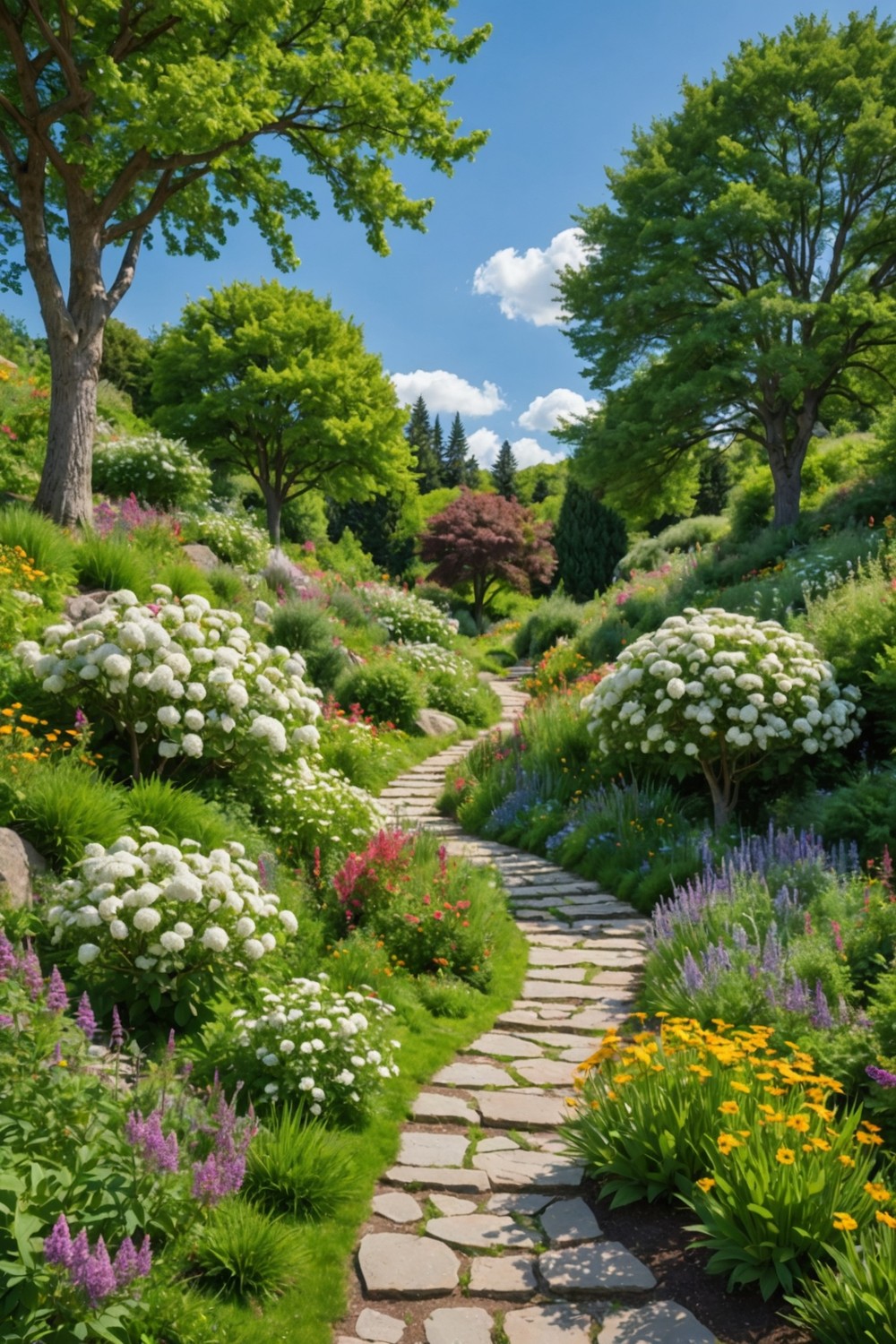
A small tree grove can add a touch of serenity and charm to your hillside garden. By planting a cluster of ornamental trees, you can create a sense of intimacy and seclusion.
Choose trees with varying heights and textures to add visual interest.
Consider native species that thrive in your local climate, and don’t forget to leave enough space for growth and air circulation.
Naturalized Bulbs
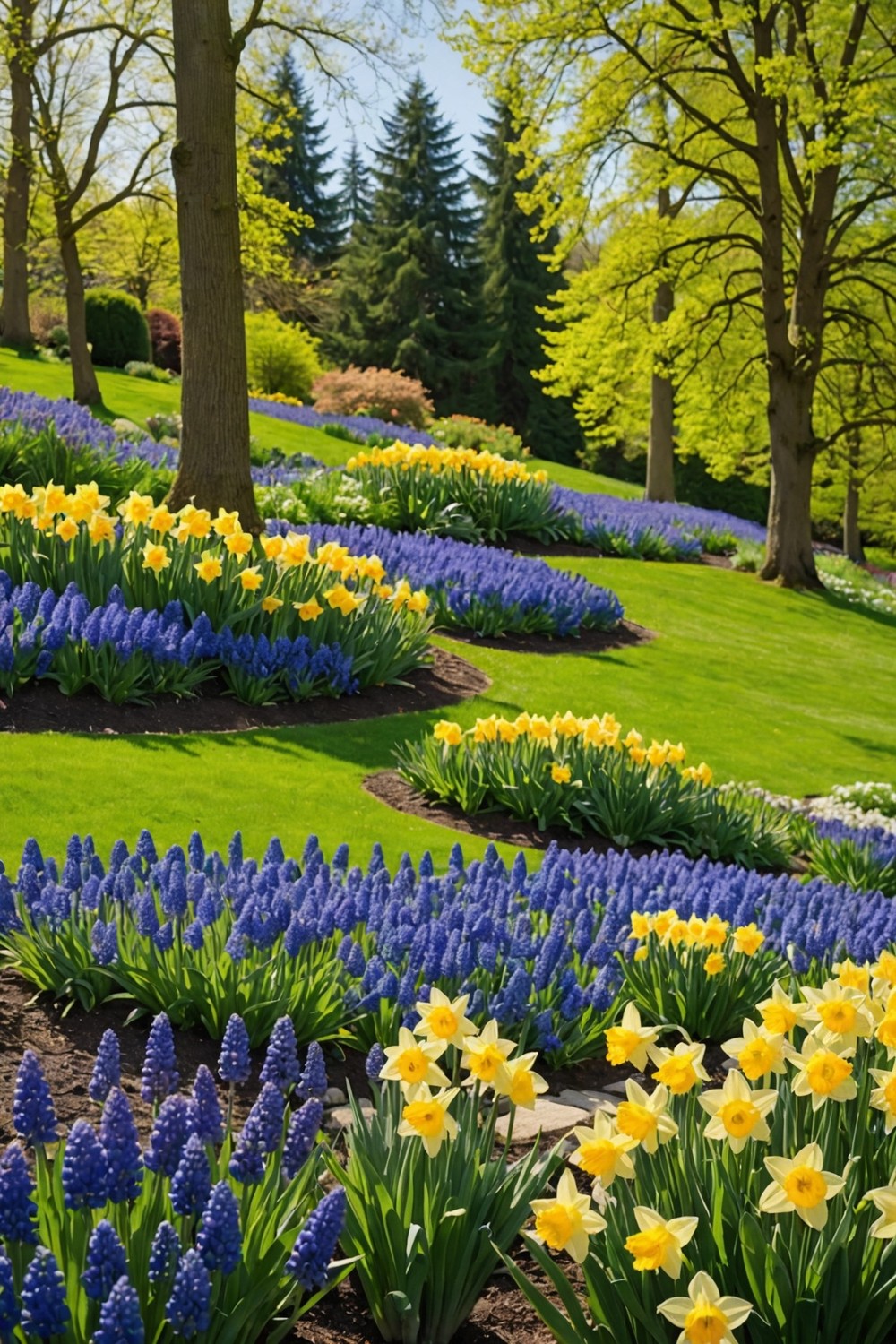
Naturalized bulbs are a great way to add beauty and simplicity to your hillside garden.
By planting bulbs like daffodils, grape hyacinths, and crocuses in a natural, random pattern, you can create a stunning display of color in the spring.
As the bulbs multiply and spread, they’ll fill in any gaps and create a lush, verdant landscape.
Plus, they’re low-maintenance and require minimal care, making them perfect for a hillside garden.
Gravel and Mulch Pathway
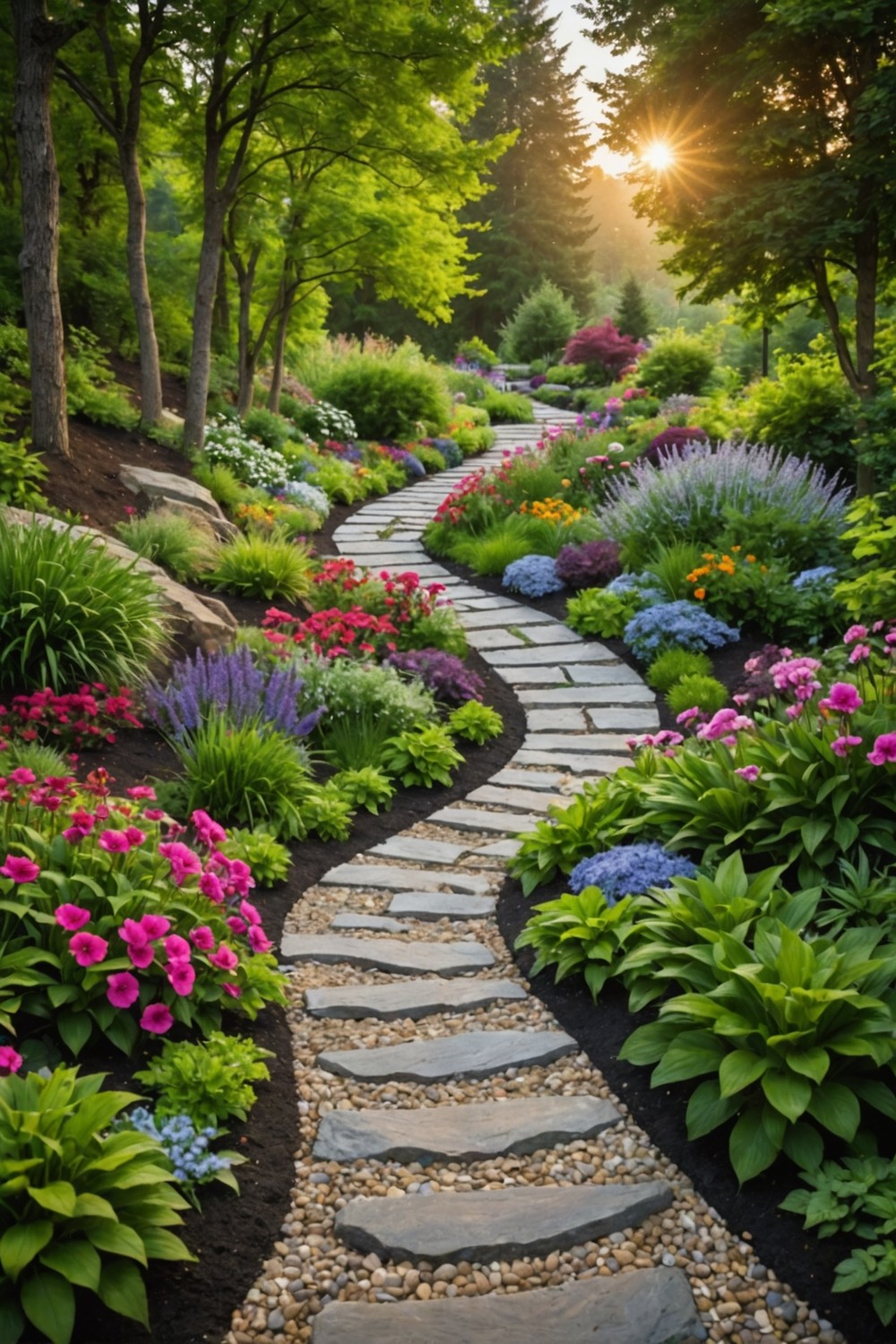
A gravel and mulch pathway is a great way to add texture and visual interest to your hillside garden. By combining the two materials, you can create a stunning and functional walkway that meanders through your garden.
The gravel provides a stable and porous surface, while the mulch adds a pop of color and helps to retain moisture in the soil.
Plus, the rustic charm of these natural materials blends beautifully with the surrounding landscape.
Hillside Herb Garden
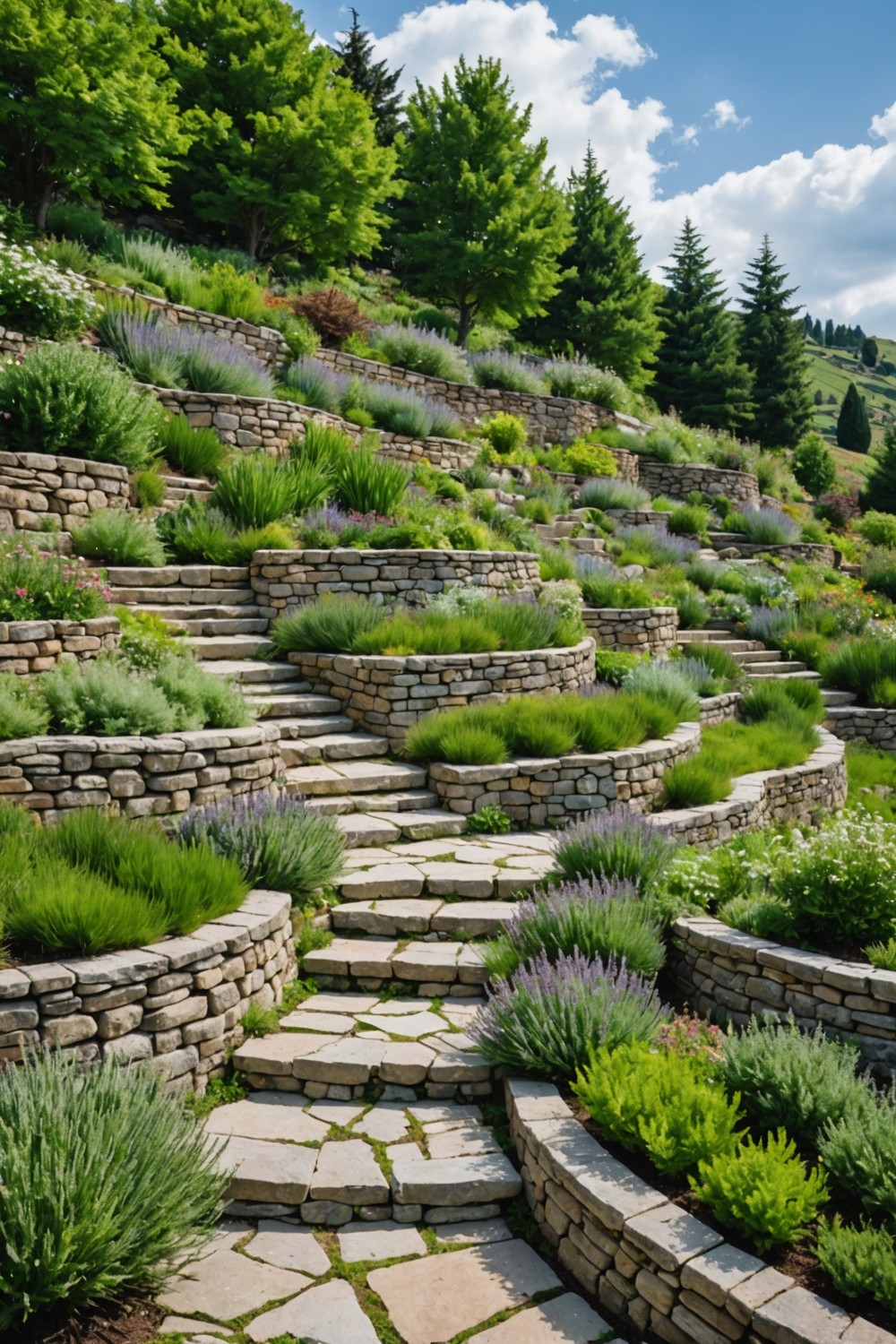
A hillside herb garden is a wonderful way to utilize a sloping area in your yard while growing your favorite herbs.
By creating a series of terraced beds or using a retaining wall, you can create a beautiful and functional garden.
This type of garden is perfect for herbs that thrive in well-draining soil and full sun, such as rosemary, thyme, and oregano.
The slope also allows for great air circulation, which can help prevent fungal diseases that often plague herb gardens.
Bird-Friendly Plantings
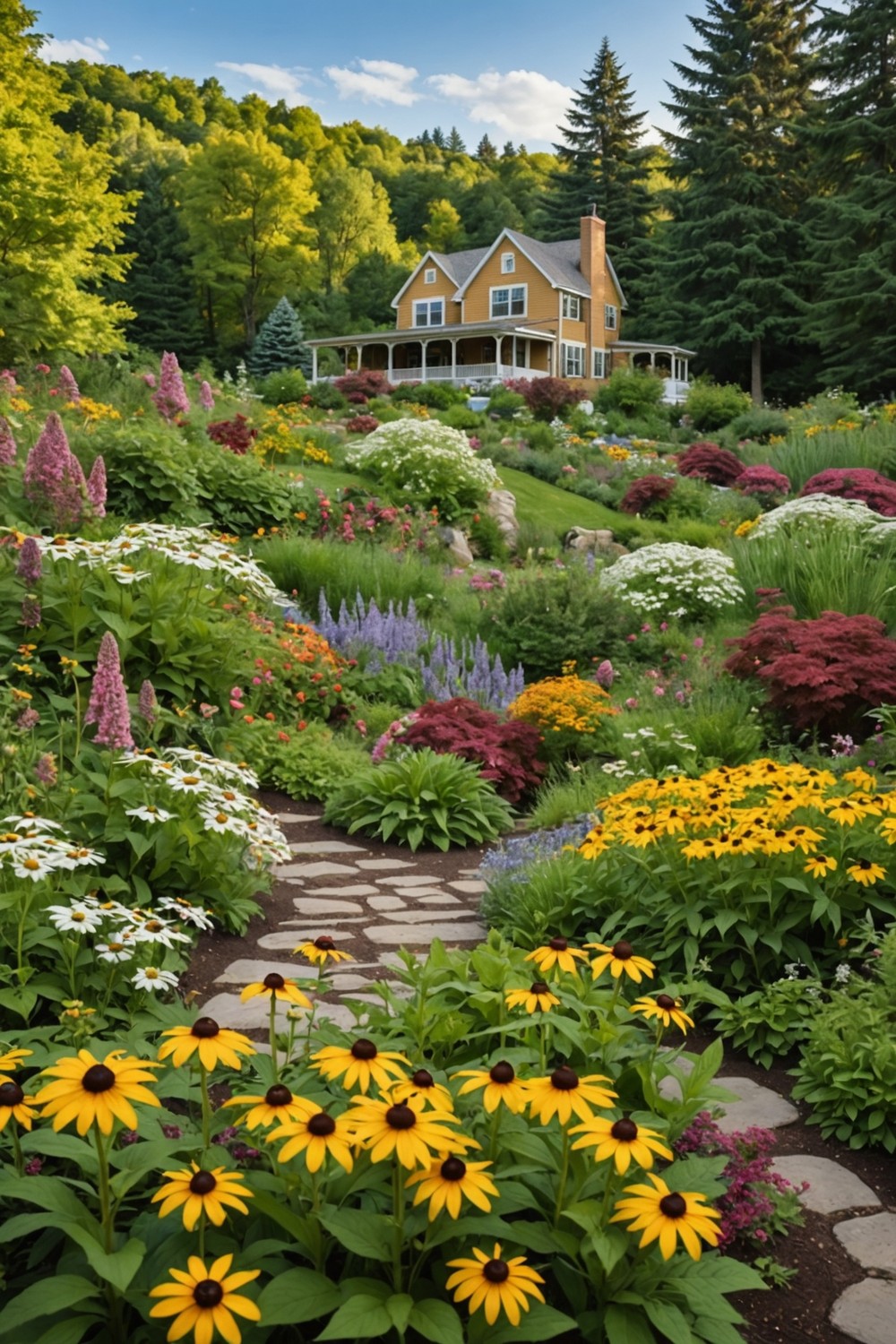
Bird-friendly plantings are a must-have for any hillside garden, as they provide a haven for our feathered friends while also adding beauty and diversity to your outdoor space.
Incorporate native plants, shrubs, and trees that produce berries, seeds, or nectar to attract a variety of bird species.
Consider plants like coneflowers, black-eyed susans, and shrub dogwoods, which are not only attractive but also provide a source of food for birds.
Rustic Log Steps
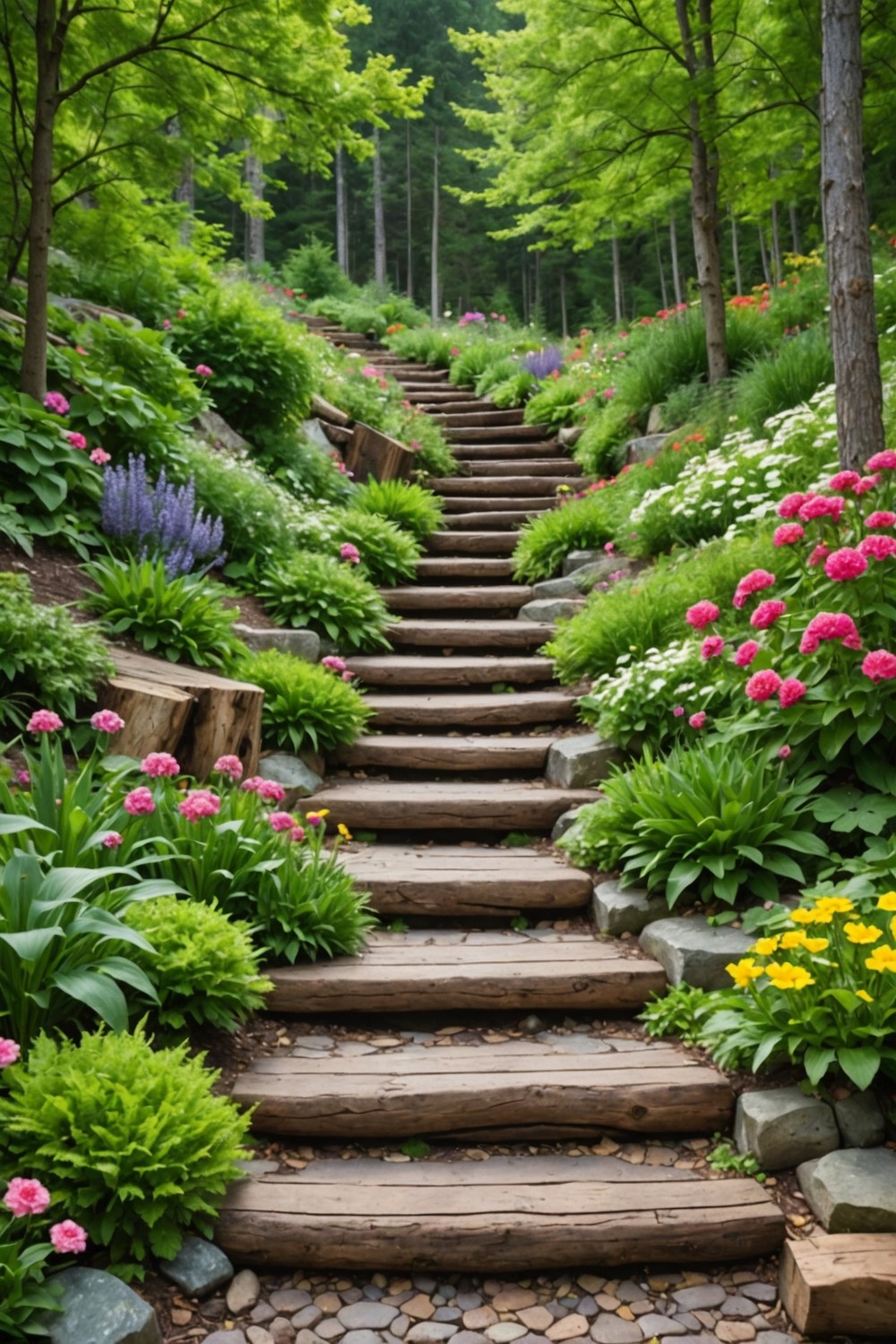
Rustic log steps blend seamlessly into a hillside garden, providing a natural and charming way to navigate the terrain.
The irregular shapes and weathered textures of the logs create a sense of organic harmony with the surrounding landscape.
By incorporating plants and greenery around the steps, you can further soften their appearance and create a sense of cohesion with the garden.
